专业培养方案 英文
华东理工 英文版 培养方案
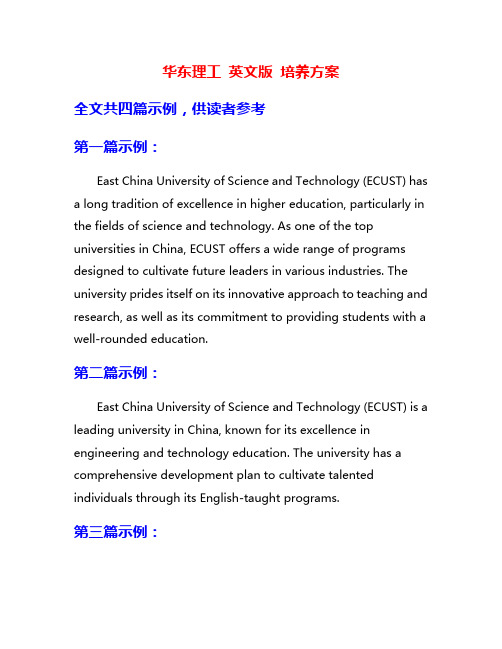
华东理工英文版培养方案全文共四篇示例,供读者参考第一篇示例:East China University of Science and Technology (ECUST) has a long tradition of excellence in higher education, particularly in the fields of science and technology. As one of the top universities in China, ECUST offers a wide range of programs designed to cultivate future leaders in various industries. The university prides itself on its innovative approach to teaching and research, as well as its commitment to providing students with a well-rounded education.第二篇示例:East China University of Science and Technology (ECUST) is a leading university in China, known for its excellence in engineering and technology education. The university has a comprehensive development plan to cultivate talented individuals through its English-taught programs.第三篇示例:In the first stage of the program, students are introduced to the fundamental concepts and principles of their chosen field of study. They are provided with a solid grounding in the theory and principles that underpin their discipline, as well as practical skills that are necessary for success in the field.第四篇示例:East China University of Science and Technology (ECUST) is one of the top universities in China, known for its strong emphasis on science and technology education. The university offers a range of programs for international students, including the English-language Bachelor's program in Chemical Engineering.。
体育教育专业培养方案英文
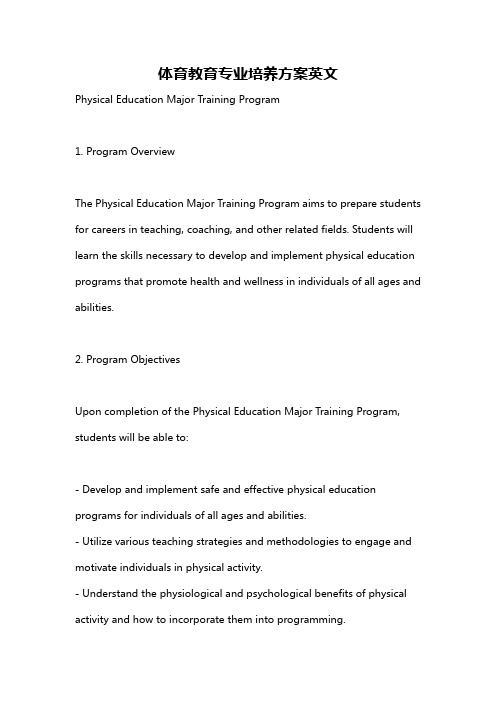
体育教育专业培养方案英文Physical Education Major Training Program1. Program OverviewThe Physical Education Major Training Program aims to prepare students for careers in teaching, coaching, and other related fields. Students will learn the skills necessary to develop and implement physical education programs that promote health and wellness in individuals of all ages and abilities.2. Program ObjectivesUpon completion of the Physical Education Major Training Program, students will be able to:- Develop and implement safe and effective physical education programs for individuals of all ages and abilities.- Utilize various teaching strategies and methodologies to engage and motivate individuals in physical activity.- Understand the physiological and psychological benefits of physical activity and how to incorporate them into programming.- Design and conduct fitness assessments and use data to inform program development.- Demonstrate proficiency in a variety of movement forms and activities. - Apply knowledge of motor control and development to teaching and coaching.- Recognize and accommodate individual differences in ability, culture, and experience.3. Program CurriculumThe Physical Education Major Training Program curriculum includes the following courses:- Foundations of Physical Education- Motor Development and Control- Physiology of Exercise- Methods of Teaching Physical Education- Assessment in Physical Education- Psychology of Physical Activity- Coaching Theory and Practice- Adapted Physical Education- Physical Education Pedagogy- Curriculum Design in Physical Education4. Program DeliveryThe Physical Education Major Training Program is typically delivered through a combination of lectures, labs, and practical experiences. Students will have the opportunity to gain hands-on experience in teaching and coaching through internships and field placements.5. Program AssessmentAssessment in the Physical Education Major Training Program will be both formative and summative. Formative assessment will include quizzes, assignments, and in-class participation. Summative assessment will include exams, projects, and presentations.6. Program DurationThe Physical Education Major Training Program typically takes four years to complete on a full-time basis.7. Program Graduation RequirementsTo graduate from the Physical Education Major Training Program, students must:- Complete all required courses with a minimum grade of C.- Complete required internships and field placements.- Maintain a minimum GPA of 2.0.- Meet all other academic and graduation requirements set forth by the institution.。
培养方案英文版范例

学科专业简介计算系统结构专业是计算机科学技术学科所属的二级学科,是计算机科学技术最活跃的研究领域之一。
特别是最近几年,随着高性能计算机、高速计算机网络和嵌入式系统的广泛深入地研究,已形成诸多新的研究热点。
本专业从应用需求出发,围绕这些研究热点,通过数年的研究积累已形成稳定的研究方向,并取得一定的学术成果。
高性能计算机系统在许多领域中有着非常重要的应用,这些领域包括科学计算、建模与仿真、图像识别与处理、计算机辅助设计、网络通信、人工智能等。
近年来,并行处理已成为高性能计算机系统的关键技术。
容错技术和实时技术是保证计算机系统执行结果的逻辑正确性和时间正确性的重要技术。
这两种技术的结合将进一步提高计算机系统和基于计算机的应用系统的实时性(如时间可预测性)和可信性(包括可靠性、安全性和可测试性等)。
计算机网络和分布式系统的研究正朝着高速、高服务质量和无线网络方向发展。
在此基础上形成多媒体信息在网络中的传输及处理、网络计算环境的知识捕获和处理、计算机支持的协同工作(CSCW)、电子商务的协议与标准等等研究热点。
嵌入式系统被定义为以应用为中心、以计算机技术为基础、软硬件可裁剪、适应应用系统对功能、可靠性、成本、体积、功耗严格要求的专用计算机系统。
嵌入式处理器的应用软件是实现嵌入式系统的关键、软件要求固化存储,软件代码要求高质量、高可靠性、系统软件的高实时性是基本要求。
在制造工业、过程控制、通讯、仪器、仪表、汽车、船舶、航空、军事装备、消费类产品等方面均是嵌入式计算机应用领域。
本方向主要从事家庭网络、e-home、智能卡技术、嵌入式操作系统和开发环境的研究。
本专业近三年来在国内外重要核心学术刊物上发表学术论文近百篇,出版著作和教材数本。
承担国家自然科学基金项目、国家重点基础研究发展计划(973)项目和省部级等科学研究项目数十项。
获得省部级等科技进步奖和优秀教材奖多项。
每年有百万元研究经费。
本专业具有稳定的、分布合理的学术梯队,共有教师20人,其中教授3人,副教授7人。
培养方案课程设置中英文对照

56
36
20
必修
信息学院
2
A4
B2
C1
C4
通识类选修(选修6学分)
1060201
研讨课
Seminar
1.0
16
以汇报形式安排4次
专题
资环学院
1
A4
B1
C1
C4
文献检索
1.0
32
选修
7
A11
B10
C1
C5
科技发展与文明传承
Scientific and Technology Development and Cultural Heritage Preservation
2.0
32
32
选修
资环学院
6
A11
B8
C5
3064226
水土保持经济植物栽培学
Economic Plant Cultivation for Soil and Water Conservation
2.0
32
24
8
选修
资环学院
5
A9
B8
C5
3064227
水土保持农学
Agronomy of Soil and Water Conservation
综合实践
(31.5学分)
1305101
军训
Military training
2.0
3周
必修
1
练(丙)
Engineering Training(C)
1.0
1周
必修
1
A1
A5
B2
C3
C4
1305201
劳动
大类招生培养方案英文版格式
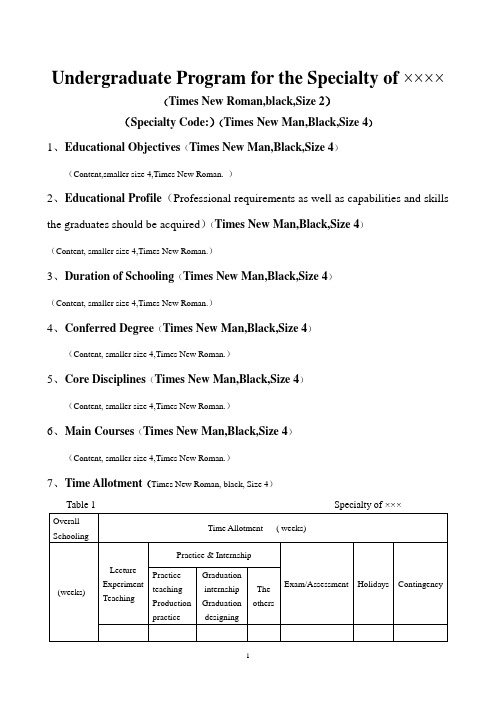
Undergraduate Program for the Specialty of ××××(Times New Roman,black,Size 2)(Specialty Code:)(Times New Man,Black,Size 4)1、Educational Objectives(Times New Man,Black,Size 4)(Content,smaller size 4,Times New Roman. )2、Educational Profile(Professional requirements as well as capabilities and skills the graduates should be acquired)(Times New Man,Black,Size 4)(Content, smaller size 4,Times New Roman.)3、Duration of Schooling(Times New Man,Black,Size 4)(Content, smaller size 4,Times New Roman.)4、Conferred Degree(Times New Man,Black,Size 4)(Content, smaller size 4,Times New Roman.)5、Core Disciplines(Times New Man,Black,Size 4)(Content, smaller size 4,Times New Roman.)6、Main Courses(Times New Man,Black,Size 4)(Content, smaller size 4,Times New Roman.)7、Time Allotment(Times New Roman, black, Size 4)8、Prime Professional Experiments(Times New Roman, black, Size 4)(Content,smaller size 4,Times New Roman.)9、The Minimum Requirements for Graduation(Times New Roman, black, Size 4)10、An Omnibus Schedule for Teaching(Times New Roman, black, Size 4)Table 311、An Omnibus Schedule for Elective Courses(Times New Roman, black, Size 4)12、The Schedule of Curriculum for Internships(Times New Roman, black, Size 4)13、Innovative Education(Times New Roman, black, Size 4)(Content,smaller size 4,Times New Roman.)14、Notes(Times New Roman, black, Size 4)1.Subjects like military traing, current affairs and economy, Ideological politics and career consultancy, can be taught in a variety of forms such as lectures, reports and seminars, without being included in overall credit hours.2. Quality education concerning humanities and ethics should be executed in line with the collegiate regulations3. Physical education should be conducted according to the collegiate regulations4. Free elective courses should be subject to announcement by the university.(Content,smaller size 4,Times New Roman.)Penner:The Person in Charge of the Specialty:注:各专业可根据自己的内容自行调节。
版培养方案中英文对照
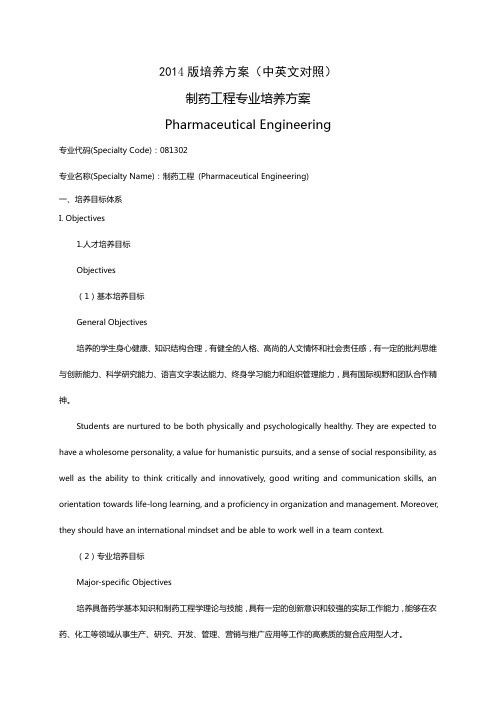
2014版培养方案(中英文对照)制药工程专业培养方案Pharmaceutical Engineering专业代码(Specialty Code):081302专业名称(Specialty Name):制药工程(Pharmaceutical Engineering)一、培养目标体系I. Objectives1.人才培养目标Objectives(1)基本培养目标General Objectives培养的学生身心健康、知识结构合理,有健全的人格、高尚的人文情怀和社会责任感,有一定的批判思维与创新能力、科学研究能力、语言文字表达能力、终身学习能力和组织管理能力,具有国际视野和团队合作精神。
Students are nurtured to be both physically and psychologically healthy. They are expected to have a wholesome personality, a value for humanistic pursuits, and a sense of social responsibility, as well as the ability to think critically and innovatively, good writing and communication skills, an orientation towards life-long learning, and a proficiency in organization and management. Moreover, they should have an international mindset and be able to work well in a team context.(2)专业培养目标Major-specific Objectives培养具备药学基本知识和制药工程学理论与技能,具有一定的创新意识和较强的实际工作能力,能够在农药、化工等领域从事生产、研究、开发、管理、营销与推广应用等工作的高素质的复合应用型人才。
型号工程师培养方案英文

型号工程师培养方案英文1. IntroductionModel engineering is an important area of engineering that involves the design, development, and testing of models to represent real-world systems. Model engineers play a critical role in the development of products, processes, and systems, and their expertise is in high demand in various industries such as automotive, aerospace, and manufacturing. To meet the growing demand for skilled model engineers, it is essential to have a comprehensive training program in place that can equip aspiring engineers with the necessary skills and knowledge. This training program aims to provide a structured learning path for model engineering students, focusing on the key areas of expertise and practical skills required for success in the field.2. Program ObjectivesThe primary objectives of the training program for model engineering are as follows:• To provide students with a comprehensive understanding of the principles and techniques of model engineering.• To develop students’ practical ski lls in model design, development, and testing through hands-on experience.• To equip students with the knowledge and skills required to apply modeling techniques to real-world engineering problems.• To foster a culture of innovation and creativity among students, encouraging them to explore new solutions and approaches in model engineering.• To prepare students for successful careers in the field of model engineering, with a strong foundation of theoretical and practical knowledge.3. Curriculum OverviewThe training program for model engineering will cover a range of subjects and practical exercises to provide students with a well-rounded education in the field. The key areas of focus in the curriculum include:• Mathematical Modeling: Students will lear n the fundamental principles of mathematical modeling and its application in engineering. This includes understanding the basic concepts of differential equations, numerical methods, and optimization techniques for modeling complex systems.• Computer-Aided Design (CAD): Students will receive training in using CAD software to create 3D models of engineering systems. They will learn how to design and simulatemodels using industry-standard software tools and gain practical experience in using CAD for real-world engineering applications.• Finite Element Analysis (FEA): The curriculum will include a module on FEA, focusing on principles of stress analysis, heat transfer, and dynamic behavior of structures. Students will gain proficiency in using FEA software to analyze and optimize model designs for performance and reliability.• Experimental Testing: Students will learn the principles and techniques of experimental testing for model validation. They will gain practical experience in setting up and conducting tests to validate model predictions and gain insights into the behavior of real-world systems.• Systems Integration: The curriculum will cover the integration of models into larger engineering systems, focusing on the practical aspects of designing and testing integrated systems. Students will gain an understanding of the challenges and opportunities in system integration and how to overcome them.• Project-Based Learning: The training program will include project-based learning, where students will work on real-world engineering projects to apply their knowledge and skills. This will enable them to gain practical experience in solving engineering problems and collaborating with peers to develop innovative solutions.4. Training MethodologyThe training program for model engineering will be delivered through a mix of theoretical lectures, practical exercises, and project work to provide a holistic learning experience for students. The training methodology will focus on the following key principles:• Hands-On Learning: Practical exercises and hands-on experience will be central to the training program, allowing students to develop their skills in model engineering through real-world applications.• Industry Collaboration: The program will collaborate with indu stry partners to provide students with exposure to real-world engineering challenges and opportunities. This will enable students to gain insights into the current trends and practices in model engineering and develop industry-relevant skills.• Mentorship and Guidance: Students will receive mentorship and guidance from experienced model engineers, who will provide support and advice on their learning journey. This will help students to develop a strong understanding of the field and gain insights from industry professionals.• Continuous Assessment: Students will undergo continuous assessment of their knowledge and skills through assignments, quizzes, and practical tests. This will ensure that students are consistently learning and improving their capabilities in model engineering.5. Duration and CertificationThe training program for model engineering will be designed as a comprehensive course, spanning over a period of 2 years. Upon successful completion of the program, students will receive a certification in model engineering, which will demonstrate their skills and knowledge in the field. The certification will be recognized by industry partners, providing students with a strong foundation for their careers in model engineering.6. ConclusionIn conclusion, the training program for model engineering aims to provide students with a structured and comprehensive education in the field, focusing on key areas of expertise and practical skills required for success. By equipping students with a strong theoretical foundation and practical experience, the program will prepare them for successful careers in model engineering and contribute to the advancement of the field. With a focus on hands-on learning, industry collaboration, and mentorship, the training program will provide students with a well-rounded education and a strong foundation for their future endeavors in model engineering.Overall, the training program for model engineering will play a critical role in nurturing the next generation of skilled model engineers, who will drive innovation and development in engineering and contribute to the advancement of society as a whole.。
建筑工程技术专科专业培养方案
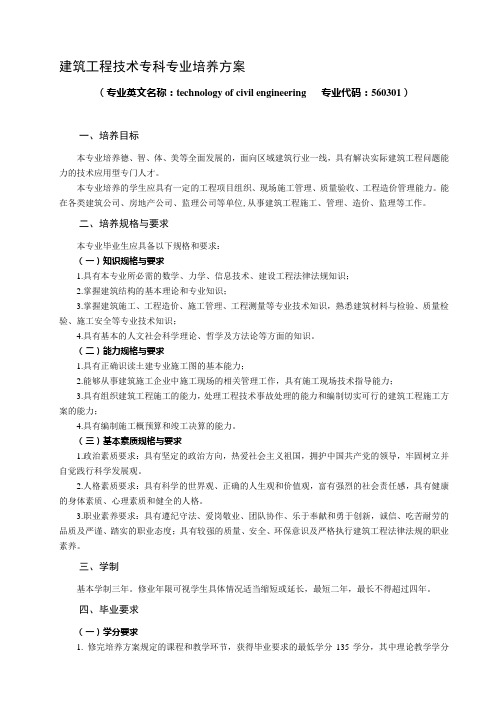
建筑工程技术专科专业培养方案(专业英文名称:technology of civil engineering 专业代码:560301)一、培养目标本专业培养德、智、体、美等全面发展的,面向区域建筑行业一线,具有解决实际建筑工程问题能力的技术应用型专门人才。
本专业培养的学生应具有一定的工程项目组织、现场施工管理、质量验收、工程造价管理能力。
能在各类建筑公司、房地产公司、监理公司等单位,从事建筑工程施工、管理、造价、监理等工作。
二、培养规格与要求本专业毕业生应具备以下规格和要求:(一)知识规格与要求1.具有本专业所必需的数学、力学、信息技术、建设工程法律法规知识;2.掌握建筑结构的基本理论和专业知识;3.掌握建筑施工、工程造价、施工管理、工程测量等专业技术知识,熟悉建筑材料与检验、质量检验、施工安全等专业技术知识;4.具有基本的人文社会科学理论、哲学及方法论等方面的知识。
(二)能力规格与要求1.具有正确识读土建专业施工图的基本能力;2.能够从事建筑施工企业中施工现场的相关管理工作,具有施工现场技术指导能力;3.具有组织建筑工程施工的能力,处理工程技术事故处理的能力和编制切实可行的建筑工程施工方案的能力;4.具有编制施工概预算和竣工决算的能力。
(三)基本素质规格与要求1.政治素质要求:具有坚定的政治方向,热爱社会主义祖国,拥护中国共产党的领导,牢固树立并自觉践行科学发展观。
2.人格素质要求:具有科学的世界观、正确的人生观和价值观,富有强烈的社会责任感,具有健康的身体素质、心理素质和健全的人格。
3.职业素养要求:具有遵纪守法、爱岗敬业、团队协作、乐于奉献和勇于创新,诚信、吃苦耐劳的品质及严谨、踏实的职业态度;具有较强的质量、安全、环保意识及严格执行建筑工程法律法规的职业素养。
三、学制基本学制三年。
修业年限可视学生具体情况适当缩短或延长,最短二年,最长不得超过四年。
四、毕业要求(一)学分要求1. 修完培养方案规定的课程和教学环节,获得毕业要求的最低学分135学分,其中理论教学学分81.7学分,实践教学学分53.3学分。
2014版培养方案中英文对照
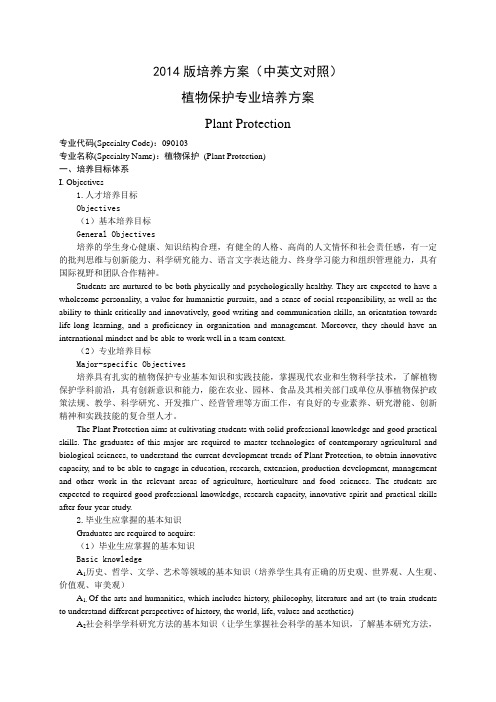
2014版培养方案(中英文对照)植物保护专业培养方案Plant Protection专业代码(Specialty Code):090103专业名称(Specialty Name):植物保护(Plant Protection)一、培养目标体系I. Objectives1.人才培养目标Objectives(1)基本培养目标General Objectives培养的学生身心健康、知识结构合理,有健全的人格、高尚的人文情怀和社会责任感,有一定的批判思维与创新能力、科学研究能力、语言文字表达能力、终身学习能力和组织管理能力,具有国际视野和团队合作精神。
Students are nurtured to be both physically and psychologically healthy. They are expected to have a wholesome personality, a value for humanistic pursuits, and a sense of social responsibility, as well as the ability to think critically and innovatively, good writing and communication skills, an orientation towards life-long learning, and a proficiency in organization and management. Moreover, they should have an international mindset and be able to work well in a team context.(2)专业培养目标Major-specific Objectives培养具有扎实的植物保护专业基本知识和实践技能,掌握现代农业和生物科学技术,了解植物保护学科前沿,具有创新意识和能力,能在农业、园林、食品及其相关部门或单位从事植物保护政策法规、教学、科学研究、开发推广、经营管理等方面工作,有良好的专业素养、研究潜能、创新精神和实践技能的复合型人才。
河南大学全日制教育硕士专业培养方案-英语

河南大学全日制教育硕士英语方向培养方案(045108)Master of Education(English)一、学科方向简介教育硕士(学科教学·英语)培养工作由河南大学外语学院承办。
本专业在国内同类专业名列前茅,现有教授16人,博士生导师11人,硕士生导师40人。
享受政府特殊津贴专家4人,河南省名师1人,河南省优秀专家2人,河南省优秀中青年骨干教师6人,河南省跨世纪学术技术带头人4人,河南省特聘教授2人和河南大学特聘教授2人。
本专业所在外国语言文学一级学科硕士点于2005年获批,属2002年批准建立的博士后流动站所辖。
本专业近年来已出版和发表一系列高质量的专著和论文,取得了丰硕的科研成果,赢得了国内外语界的好评。
指导教师学术造诣深厚、治学严谨,有丰富的教学和指导培养研究生的经验,所开设的课程具有理论性、实践性和前沿性,可以为学生将来从事科研和教学工作打下坚实的基础。
二、培养目标及基本要求培养掌握现代教育理论、具有较强的教育教学实践和研究能力的高素质的中小学管理人员和教师。
具体要求为:(一)拥护中国共产党领导,热爱教育事业,具有良好的道德品质,遵纪守法,积极进取,勇于创新。
(二)具有良好的学识修养和扎实的专业基础,了解学科前沿和发展趋势。
(三)具有较强的管理实践能力,能胜任相关的教育管理工作,在现代教育理论指导下运用所学理论和方法,熟练使用现代教育技术,解决教育管理中的实际问题;能理论结合实践,发挥自身优势,开展创造性的教育管理工作。
(四)熟悉基础教育课程改革,掌握基础教育课程改革的新理念、新内容和新方法。
(五)能运用一种外国语阅读本专业的外文文献资料。
三、招生对象具有国民教育序列大学本科学历或大学专科毕业两年的人员。
四、学习形式与年限采用全日制学习方式,学习年限一般为2年。
其中第一年主要是课程学习,完成教学计划课程后到基础教育工作岗位进行研究性教学实践活动与论文写作。
五、课程设置课程设置体现理论与实践相结合的原则,分为学位基础课程,专业必修课程,专业选修课程,实践教学四个模块。
工程人才培养方案英文版本

工程人才培养方案英文版本1. IntroductionEngineering professionals are essential for the growth and development of various industries. They are responsible for designing, implementing, and maintaining innovative solutions that drive progress and improvement in modern society. As such, the need for talented and skilled engineering professionals is paramount. In order to meet this demand,a comprehensive talent cultivation program for engineering professionals is necessary.2. Program ObjectivesThe main objectives of the talent cultivation program for engineering professionals are as follows:- To provide students with a solid foundation in engineering principles and practical skills. - To equip students with the critical thinking and problem-solving abilities necessary for success in the engineering field.- To offer students opportunities for hands-on experience through internships, cooperative education programs, and research projects.- To ensure that graduates are prepared to meet the evolving needs and demands of the engineering industry.- To foster a strong sense of ethics, professionalism, and social responsibility among engineering professionals.3. Program ComponentsThe talent cultivation program for engineering professionals will consist of the following components:3.1 Academic CurriculumThe academic curriculum will provide students with a strong theoretical foundation in engineering, including core courses in mathematics, science, and engineering principles. In addition, students will have the opportunity to choose specialized courses in their area of interest, such as civil engineering, mechanical engineering, electrical engineering, or computer engineering. The curriculum will be designed to provide students with a broad understanding of engineering principles, as well as the specific knowledge and skills required for their chosen field of study.3.2 Hands-on ExperienceHands-on experience is essential for the professional development of engineering students. The talent cultivation program will provide students with opportunities for hands-onexperience through a variety of initiatives, including internships, cooperative education programs, and research projects. These experiences will allow students to apply the knowledge and skills they have acquired in the classroom to real-world engineering challenges, and will help them develop the practical skills and problem-solving abilities necessary for success in the engineering field.3.3 Professional DevelopmentProfessional development is an important aspect of the talent cultivation program. Students will be provided with opportunities to develop their communication, leadership, and teamwork skills, and will be encouraged to participate in extracurricular activities, such as engineering clubs and professional organizations. In addition, students will receive guidance and support to help them prepare for the transition from college to the workplace, including assistance with resume writing, job interviews, and networking.3.4 Ethics and Social ResponsibilityEthics and social responsibility are integral components of the talent cultivation program. Students will be guided to understand the ethical considerations and social impact of engineering work, and will be encouraged to integrate these principles into their professional practice. They will be taught to consider the broader implications of their work, including environmental sustainability, public safety, and the welfare of society as a whole.4. Program ImplementationThe talent cultivation program for engineering professionals will be implemented through a collaborative effort between educational institutions, industry partners, and professional organizations. The program will be designed to meet the needs of both students and the engineering industry, and will be continuously evaluated and revised to ensure its effectiveness.4.1 Educational InstitutionsEducational institutions will play a central role in the implementation of the talent cultivation program. They will be responsible for developing and delivering the academic curriculum, providing opportunities for hands-on experience, and fostering professional development among students. In addition, they will work to promote an environment of ethics and social responsibility within the engineering community.4.2 Industry PartnersIndustry partners will be critical to the success of the talent cultivation program. They will provide support for hands-on experience initiatives, such as internships and cooperative education programs, and will offer valuable insight into the evolving needs and demands of the engineering industry. Industry partners will also have the opportunity to engage with students through mentorship programs and networking events, which will help to bridge the gap between education and the workplace.4.3 Professional OrganizationsProfessional organizations will play a vital role in the talent cultivation program, providing students with access to resources, information, and networking opportunities. They will also support the development of ethics and social responsibility among engineering professionals, and will help to foster a strong sense of professionalism within the engineering community.5. Program EvaluationThe talent cultivation program for engineering professionals will be subject to ongoing evaluation to ensure its effectiveness and relevance. This evaluation will be conducted through a combination of quantitative and qualitative measures, including student performance, employer feedback, and industry trends. The results of the evaluation will be used to make adjustments and improvements to the program, ensuring that it continues to meet the needs and demands of the engineering industry.6. ConclusionThe talent cultivation program for engineering professionals is an essential initiative for the development of skilled and talented engineering professionals. By providing students with a strong academic foundation, hands-on experience, professional development opportunities, and a strong sense of ethics and social responsibility, the program will prepare graduates to meet the evolving needs and demands of the engineering industry. Through collaboration between educational institutions, industry partners, and professional organizations, the program will play a key role in ensuring a steady supply of skilled engineering professionals, driving progress and improvement in modern society.。
英文专业培养方案
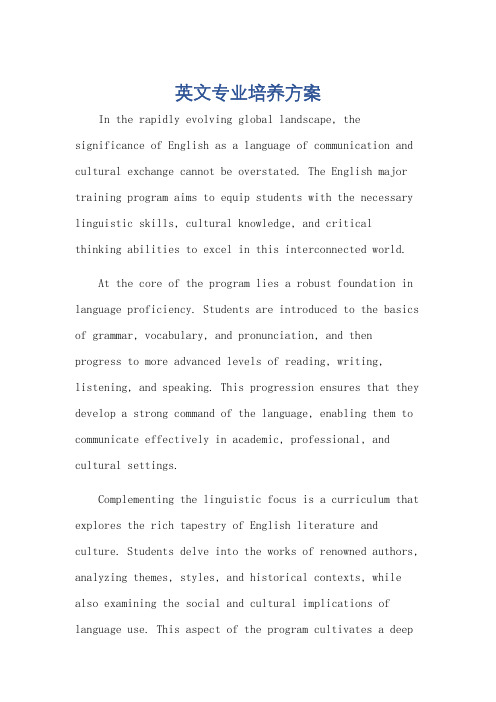
英文专业培养方案In the rapidly evolving global landscape, the significance of English as a language of communication and cultural exchange cannot be overstated. The English major training program aims to equip students with the necessary linguistic skills, cultural knowledge, and criticalthinking abilities to excel in this interconnected world. At the core of the program lies a robust foundation in language proficiency. Students are introduced to the basics of grammar, vocabulary, and pronunciation, and then progress to more advanced levels of reading, writing, listening, and speaking. This progression ensures that they develop a strong command of the language, enabling them to communicate effectively in academic, professional, and cultural settings.Complementing the linguistic focus is a curriculum that explores the rich tapestry of English literature and culture. Students delve into the works of renowned authors, analyzing themes, styles, and historical contexts, while also examining the social and cultural implications of language use. This aspect of the program cultivates a deepappreciation for the English language and its role in shaping global perspectives.In addition, the program emphasizes the development of critical thinking and analytical skills. Students are encouraged to question, challenge, and evaluate information, arguments, and perspectives presented in their studies.This approach sharpens their ability to form coherent and well-argued opinions, making them effective contributors to academic discussions and professional environments.Moreover, the program recognizes the importance of practical experience in language learning. It incorporates opportunities for students to engage in real-world language use, such as participation in exchange programs, internships, and volunteer opportunities that expose themto diverse cultures and languages. These experiences not only enhance their language proficiency but also broaden their cultural horizons.The English major training program also prepares students for future careers by providing them with a rangeof professional skills. Coursework covers areas such as business communication, media studies, and translation,equipping students with the tools and knowledge necessaryto excel in a wide array of professions.In summary, the English major training program is a comprehensive and multi-faceted approach to languagelearning that cultivates global communicators. It combinesa strong foundation in language proficiency with an exploration of English literature and culture, the development of critical thinking skills, and practical experiences that prepare students for success in theirfuture careers. Through this program, students are not just learning a language, but are also developing the tools and perspectives necessary to engage effectively with the world. **英文专业培养方案:塑造全球沟通者**在全球化的快速发展中,英语作为交流和文化交换的语言的重要性不言而喻。
- 1、下载文档前请自行甄别文档内容的完整性,平台不提供额外的编辑、内容补充、找答案等附加服务。
- 2、"仅部分预览"的文档,不可在线预览部分如存在完整性等问题,可反馈申请退款(可完整预览的文档不适用该条件!)。
- 3、如文档侵犯您的权益,请联系客服反馈,我们会尽快为您处理(人工客服工作时间:9:00-18:30)。
专业培养方案英文
Professional Development Program
1. Introduction:
The Professional Development Program is designed to provide students with an opportunity to develop the necessary skills and knowledge required for a successful career in their chosen profession. The program aims to equip students with both theoretical and practical understanding, enabling them to excel in their field.
2. Coursework:
The program includes a comprehensive coursework component that covers a wide range of topics relevant to the profession. Students will take core courses that provide a solid foundation in the discipline, as well as elective courses to further specialize in their area of interest. The coursework incorporates both theoretical concepts and practical applications to ensure a well-rounded learning experience.
3. Practical experience:
In addition to the coursework, the program emphasizes the importance of gaining practical experience in the field. Students will have the opportunity to undertake internships or work placements, where they can apply their knowledge and skills in real-world settings. This hands-on experience not only enhances their learning but also builds their professional network and boosts their employability.
4. Professional seminars and workshops:
The program includes regular seminars and workshops conducted by industry professionals and experts. These events provide students with insights into current trends and practices in the profession. Students will have the opportunity to interact with professionals, ask questions, and learn from their experiences. This exposure helps students stay updated with industry advancements and builds their confidence in the professional environment.
5. Professional certifications:
The program encourages students to pursue professional certifications relevant to their field. These certifications validate their knowledge and expertise and enhance their credibility in the job market. The program provides support and resources to help students prepare for these certifications, including study materials, mock exams, and guidance from experienced professionals.
6. Career development:
Throughout the program, students will receive guidance and support in their career development. This includes assistance with resume writing, interview preparation, and job searching strategies. The program also facilitates networking opportunities, such as career fairs and industry events, where students can connect with potential employers and explore job opportunities.
7. Research and project work:
As part of the program, students will have the opportunity to engage in research or project work
related to their field. This enables them to delve deeper into their area of interest and contribute to the advancement of knowledge in their profession. The program provides access to resources and faculty guidance to support students in their research endeavors.
By following this Professional Development Program, students will be well-prepared to enter the workforce and succeed in their chosen profession. The program provides a comprehensive and holistic approach to professional development, equipping students with the necessary skills, knowledge, and practical experience to thrive in the competitive job market.。
